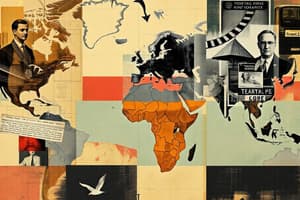Podcast
Questions and Answers
What does Sylvester emphasize in the traditional approaches to International Relations?
What does Sylvester emphasize in the traditional approaches to International Relations?
- The role of market transactions
- The importance of nonstate actors
- The focus on impersonal actors, structures, and processes (correct)
- The significance of individual actors
What is the conventional view of the world in terms of actors?
What is the conventional view of the world in terms of actors?
- Nonstate actors dominate the scene
- Men and women play a central role
- Impersonal actors are irrelevant
- States are the primary actors (correct)
In international relations, what aspect does Sylvester suggest is often overlooked?
In international relations, what aspect does Sylvester suggest is often overlooked?
- The significance of impersonal structures
- The impact of market transactions
- The influence of individuals in decision-making (correct)
- The autonomy of state actors
What question does the text pose regarding the operation of states?
What question does the text pose regarding the operation of states?
What is one purpose of making assumptions about nation-states according to the text?
What is one purpose of making assumptions about nation-states according to the text?
Which aspect of state behavior is the text suggesting we need to understand in order to arrive at theories about them?
Which aspect of state behavior is the text suggesting we need to understand in order to arrive at theories about them?
According to Sylvester, what enables us to draw conclusions in International Relations?
According to Sylvester, what enables us to draw conclusions in International Relations?
What major theme does Sylvester explore about nation-states in her book?
What major theme does Sylvester explore about nation-states in her book?
How does Sylvester challenge the notion of state monolithic entities?
How does Sylvester challenge the notion of state monolithic entities?
Flashcards are hidden until you start studying
Study Notes
Declaring War on Non-State Actors
- Declaring war on a non-state actor, such as a terrorist group, may require violating the sovereignty of a nation-state to attack the group within its borders.
- Non-state actors, like terrorist groups and multinational corporations (MNCs), play a critical role in influencing international decisions and affecting nation-states.
Multinational Corporations (MNCs)
- MNCs, such as Wal-Mart, have significant influence on multiple countries and the international system as a whole.
- The levels-of-analysis approach helps understand the role of MNCs and their impact on globalization.
International Relations (IR)
- IR examines who makes decisions, from governments to individual decision-makers, and how those decisions affect people, society, culture, or individuals within nation-states.
- IR looks at the "big picture" questions and considers the interrelated and interdependent nature of nation-states and non-state actors.
Non-State Actors and Nation-States
- Non-state actors, like terrorist groups, have emerged as major players in the international system, affecting the behavior of states.
- The presence of non-state actors has challenged traditional IR questions and approaches.
Understanding Decision-Making
- Understanding who makes decisions for nation-states and non-state actors is crucial to understanding international relations.
- Individuals play a significant role in steering the direction of a state, and their decisions can have a profound impact on international relations.
Assumptions and Theories
- Making assumptions about nation-states and their behavior allows us to generalize and identify patterns in international relations.
- These assumptions can help us draw conclusions and understand cases that don't fit the patterns.
Studying That Suits You
Use AI to generate personalized quizzes and flashcards to suit your learning preferences.



